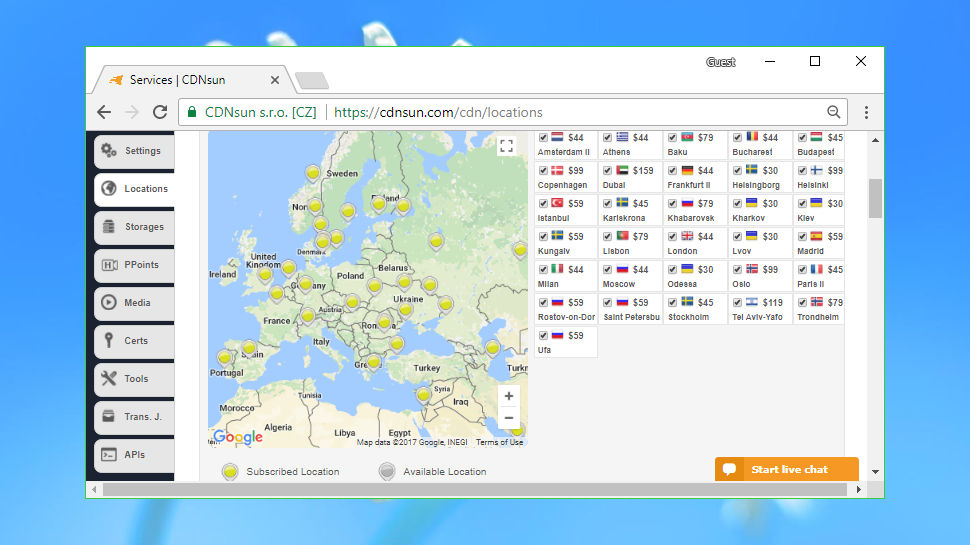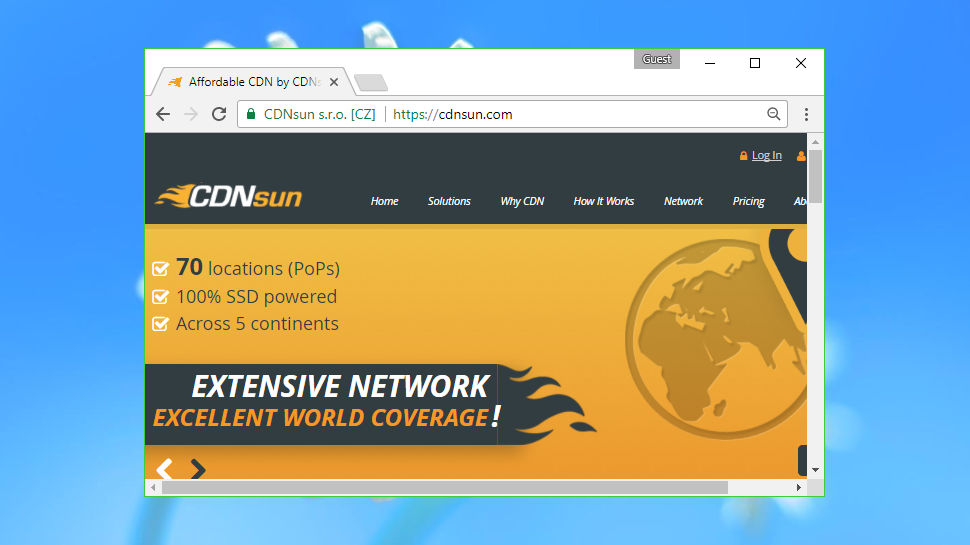TechRadar Verdict
This CDN offers enterprise-level features at small business prices. A must-try for experienced users.
Pros
- +
70+ locations
- +
Free Let's Encrypt custom SSL
- +
Comprehensive documentation
- +
No minimum charge
Cons
- -
Bandwidth prices vary per location
- -
Feature-packed console might intimidate novices
Why you can trust TechRadar
CDNsun is a Czech content delivery network which offers a wide range of features for a budget price.
Network size doesn't tell you much on its own, but it's hard not to be impressed by CDNsun's 70+ locations. With 32 in Europe, 23 in North and South America and 17 in Oceania, you're getting access to more than twice the POPs of some of the competition.
The service supports multiple CDN types: origin pull (content is hosted on your server and grabbed when required), origin push (content is hosted with CDNsun), live video streamed from your site, or live video streamed from CDNsun.
There's free shared SSL support on CDSun's *.r.worldssl.net domain. The company can provide a free custom Let's Encrypt SSL certificate to cover your own domain, or you can use a custom certificate of your own, and in all cases CDNsun enables it for free.
If you're starting from scratch, CDNsun can provide a custom SAN Cloud SSL certificate for a standard $660 (£530) a year plus a one-off installation fee of $39 (£31).
The service provides several ways to protect your content. You can block everyone but a few trusted domains from hotlinking to your files. There's support for restricting requests by country and IP address. URL Signing is a token authentication feature which ensures only requests with a valid token are allowed access, handy for paid content. You can even password-protect some or all your resources.
If you've ever used another CDN, you'll recognise many of the other settings. You can set your cache expiry time, set your origin protocol and port (HTTPS, HTTP, 80/443), choose how to handle query strings and cookies, block crawlers and more.
Sign up to the TechRadar Pro newsletter to get all the top news, opinion, features and guidance your business needs to succeed!
Reports include real-time stats, details on your cache utilization (cache hits, origin hits, cache hit ratio) and HTTP status codes. Raw logs are also available via FTP, FTPS, SFTP and RSYNC priced from $2 a month per CDN.
Wowza-powered video streaming automatically transcodes your content to work with multiple protocols, including RTMP/RTMPE (Flash), HLS (Apple, Android, HTML5 players), RTSP, MSS (Windows Phone, Silverlight players) and HDS (HTML5 players).
If you're interested in the video side, CDsun has many options and features to help. Check out the excellent website article for guidance.
Pricing
CDNsun Business, the company's baseline plan, appealed to us immediately as it has no monthly fee and no minimum traffic level. You get all the same features that enterprise customers benefit from, and the sole restriction is the plan 'only' supports up to 10 websites (high-end accounts can go up to 50).
Pricing can be complicated as every POP – not just every region – has its own charge for data transfer. Prices range from $0.03 in some areas of Europe, up to $0.27 in South Africa.
Fortunately, CDNsun offers a calculator to give you some estimates. It suggested 1TB of data transfer spread 50/50 between Europe and North America might cost around $49 (£39), for example, or a very reasonable $0.049 per GB.
Even when we reallocated transfers to be 60% from the more expensive Asia and South America, the cost was around $97 (£78) or $0.0097 per GB. That's more expensive than some – KeyCDN charges a flat rate of $0.04 anywhere in the world – but significantly better than Cloudfront and many others, especially as there's no extra charge for requests or HTTPS.
Upgrading to a higher bandwidth plan gives you support for more sites, and marginally cuts the per-GB cost.
All plans come with 20GB storage for free. After that, prices range from $5 (£4) per month for 50GB to $169 (£135) for a giant 2TB.
There are other potential costs for video streaming or premium SSL, but CDNsun doesn't hide these away. They're all listed on a single Pricing page, with calculators where necessary to help you figure out the costs.
CDNsun offers a free trial to help you check out the service. This essentially means they credit your account with $2 (£1.60) of traffic, worth around 40GB of traffic at best, so it's not exactly generous. Still, it's enough to get a feel for the product, and with no monthly fee you can run extra tests at minimal cost.

Setup
Tired of companies demanding endless personal details when you sign up for something? CDNsun takes a much simpler approach. Fill in one small form with your company name and email address, choose your time zone, click Submit and an email arrives moments later with your login details.
We clicked the email link, entered our allocated password and were taken directly to the CDNsun console. This looks a little intimidating, at least initially, as it's so crammed with options: twelve tabs down the left-hand side (New Service, Settings, Locations, Storage, PPoints, Media, Certs, and more), four at the top (Reports, Services, Billing, Help). Even the opening ‘Create a new Service’ dialog has multiple tabs for Pull, Push, Live, VOD, VOD Push and Live.
Look more closely, though, and interface works very well. At a minimum, you can create a service by entering a CDN and origin domain (cdn.mydomain.com and www.mydomain.com). Every CDN type has a brief but clear description of what it does, and the interface also has pointers to information you need to understand. ('Looking for CDN with SSL support? Please read this first.')
Click an Advanced Settings button and you're able to browse and tweak a wide range of options: cache expiry time, query string and cookie handling, hotlinking policy, geofiltering, traffic limiting and more.
Just as you'd expect from a panel labelled ‘Advanced...’, there are plenty of technical features. They're better arranged and presented than you'll see with most CDNs, though, and every settings box has a tooltip with genuinely helpful details.
After service creation, a 'CDN Service How-To' page displays your allocated CDN domain, which will look something like '252720767.r.CDNsun.net'. There's some helpful guidance (with examples) on how to change your website links to point to the CDN, as well as a content checker and CURL tool to check the status of CDN content (that's what we call thorough).
Clicking the 'Custom Setup' tab explains how to use CNAME records to set up a custom domain (cdn.myname.com), and again provides practical examples of how you can update your website to use the CDN.
Moving on to the main console, a Locations tab displays all the CDNsun locations you're willing to use. If you don't want to use more costly POPs, they can be disabled with a click. This works individually, not just by region, so for example you could disable the two most expensive Australian POPs, but keep the cheapest to still give users some benefit.
A 'Storages' tab enables creating a CDNsun-hosted account for storing some of your files. You can set this up with a click, the site displays the hostname, username and password, and you can upload content via FTP, FTPS, SFTP, RSYNC or the API. It's quick, easy, and as you get 20GB of storage for free, well worth doing. Place some of your larger static files here and you'll reduce the load and bandwidth costs for your origin server.
A Tools section allows prefetching files so they're immediately available for their first request, as well as purging specific objects or the entire cache.
There are some unusual but welcome tools to help you troubleshoot problems. You can check whether your DNS settings have propagated, see if specific files are included within the CDN, or compare content on CDN edge services to make sure they're in sync. You probably won't need these features very often – maybe you'll never use them at all – but it's still good to see a company that thinks ahead and goes to such lengths to help you out.
There's a lot to like here, then, but CDNsun's standout feature is probably its in-depth documentation. While other CDNs might give you a couple of lines on a feature like 'HTTP pseudo-streaming', CDNsun provides a detailed 600-word description on what it is, where it's set, how it works, gives you multiple usage examples, tells you about compatible players, points you to a page where you can test your setup, and has links to other related documents.
Maybe you just want to know how to integrate CDNsun with your CMS or website application? CDNsun has almost 40 tutorials including everything from a comprehensive WordPress guide to expert-level advice on streaming video via FFmpeg.
It's a very impressive collection of documents which tramples all over the best efforts of many competitors. If support matters to you, spend a moment browsing the CDNsun knowledgebase to see what's on offer.

Performance
Figuring out which is the fastest CDN for your website can be a real challenge, as there are so many points to consider. Do you have a simple static website, are you using WordPress, maybe streaming video? What type and size of files are you caching, how often are they updated, where are your visitors located?
Normally we would try to compare a simple metric like HTTP response time at CDNPerf, but as CDNsun doesn't yet appear on the list, there's no data to examine.
Falling back on general impressions, CDNsun's large network should improve speeds, particularly in Oceania and other areas which aren't well served by most providers. The service doesn't have the image compression, Brotli support or other extras that might further reduce file size and accelerate performance. But on the plus side, CDNsun's array of configuration options and settings (and the excellent documentation explaining them) should help you get the very best out of the network.
On balance, we think it's likely most people will get decent performance from the service. There's no way to say for sure, but the free trial and pay-as-you-go pricing means that you can test CDNsun's capabilities for very little outlay.
Final verdict
An appealing service with loads of features, a stack of configuration options, and some of the most comprehensive documentation you'll find anywhere. A must-see for anyone who's looking for more than the CDN basics.
- We’ve rounded up the best CDNs of 2018

Mike is a lead security reviewer at Future, where he stress-tests VPNs, antivirus and more to find out which services are sure to keep you safe, and which are best avoided. Mike began his career as a lead software developer in the engineering world, where his creations were used by big-name companies from Rolls Royce to British Nuclear Fuels and British Aerospace. The early PC viruses caught Mike's attention, and he developed an interest in analyzing malware, and learning the low-level technical details of how Windows and network security work under the hood.
